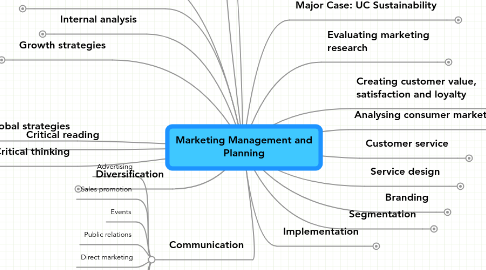Marketing Management and Planning
作者:Brad Williams

1. General Marketing Theory
1.1. Marketing mix
1.2. Customer mix
1.3. Target markets, positioning and segmentation
1.4. Creating value
1.5. Product life cycle
2. Strategies Processes and Plans
2.1. Marketing planning process
2.2. Marketing planning cycle
2.3. Mission statement
2.4. SBU structure
2.5. Ansoff's grid model
2.6. Corporate culture
2.7. Market opportunity analysis
2.8. Goal formation
2.9. Market analysis
2.10. Forecasting
2.11. Profitability
2.12. Competition
3. Environmental Analysis
3.1. Technology
3.2. Government
3.3. Economics
3.4. Culture
3.5. Demographics
3.6. SWOT analysis
3.7. PESTEL analysis
3.8. Five forces analysis
3.9. Impact analysis
3.10. Scenario analysis
3.11. Porters value chain
4. Competitor and industry analysis
4.1. Competitor actions
4.2. Exit barriers
4.3. Market leader
4.4. Strength and weakness checklist
5. Internal analysis
5.1. Service distinction
5.2. Matching demand and supply
5.3. Improving service quality
5.4. Customer failure
5.5. Sales and profitability
5.6. Brand loyalty
5.7. Cost vs performance
5.8. Organisational capabilities/constraints
5.9. Strategic decisions
5.10. Growth - share matrix
6. Critical thinking
6.1. Disposition
6.2. Criteria
6.3. Argument
6.4. Reasoning
6.5. Point of view
7. Critical reading
8. Growth strategies
8.1. Market development
8.2. Product development
8.3. Diversification
8.4. Growth of existing product
8.5. Incentives
8.6. Vertical integration
9. Global strategies
9.1. scale economies
9.2. cross subsidisation
9.3. strategic alliances
10. Diversification
10.1. Internal expansion
10.2. External expansion
10.3. sub brand
10.4. endorsed brand
11. Communication
11.1. Advertising
11.2. Sales promotion
11.3. Events
11.4. Public relations
11.5. Direct marketing
11.6. Interactive marketing
11.7. Word of mouth
11.8. Personal selling
12. Major Case: UC Sustainability
12.1. Branding
12.2. Proposal
12.3. Facebook
13. Evaluating marketing research
13.1. Strategic issues and considerations
13.2. Secondary vs primary data
13.3. Marketing research process
13.4. Qualitative measures
13.5. Sampling
13.6. Marketing decision support system
13.7. Measures of market demand
14. Creating customer value, satisfaction and loyalty
14.1. customer perceived value determinants
14.2. customer relationship management
14.3. customer retention strategies
15. Analysing consumer markets
15.1. Freud's theory
15.2. Maslow's hierarchy of needs
15.3. Herzberg's two factor theory
15.4. consumer buying process
15.5. social factors
15.6. lifestyle factors
16. Customer service
16.1. Image
16.2. Consumer decision model
16.3. Service value model
16.4. Subliminal perception
17. Service design
17.1. The house of quality
17.2. 12 principles for service design
18. Branding
18.1. strategy decisions
18.2. development
18.3. valuation
18.4. maintenance
19. Segmentation
19.1. geographic
19.2. demographic
19.3. psychographic
19.4. behavioural
20. Implementation
20.1. strategy evaluation
20.2. control
20.3. marketing audit


